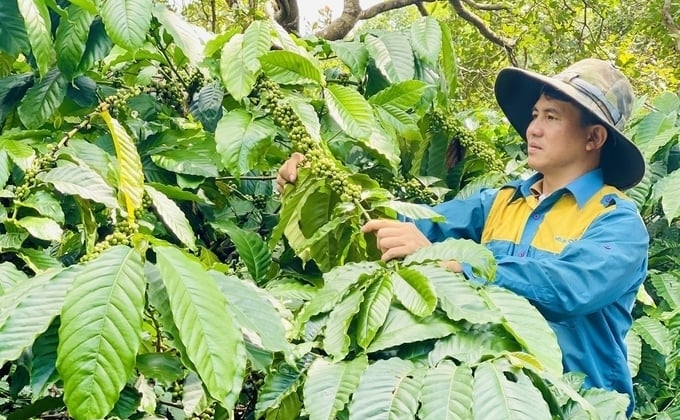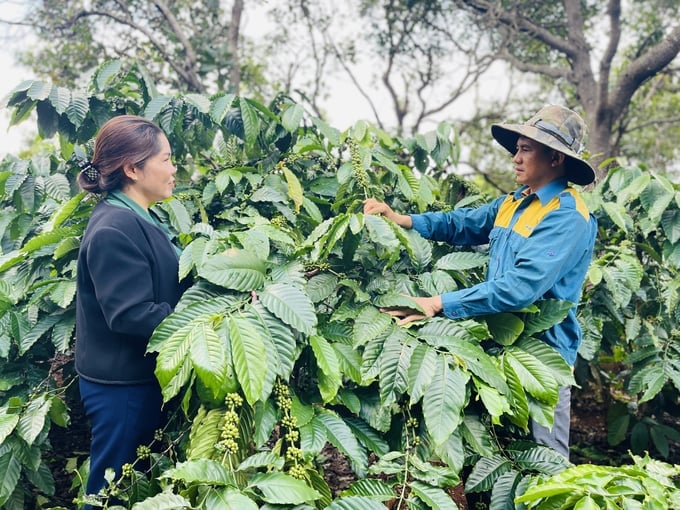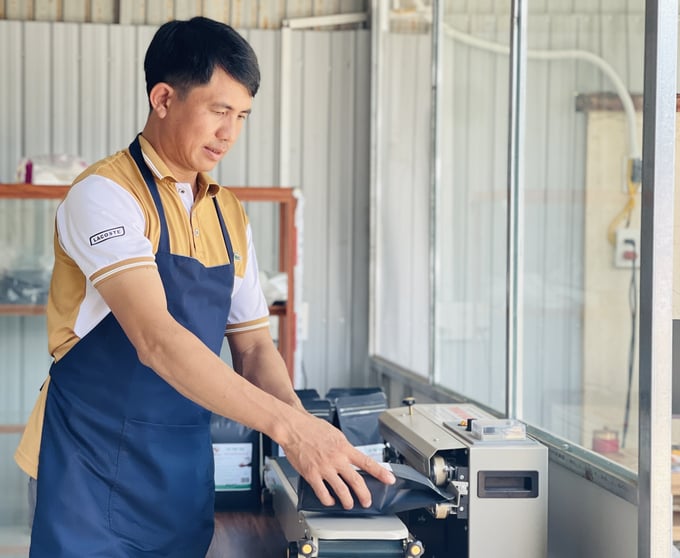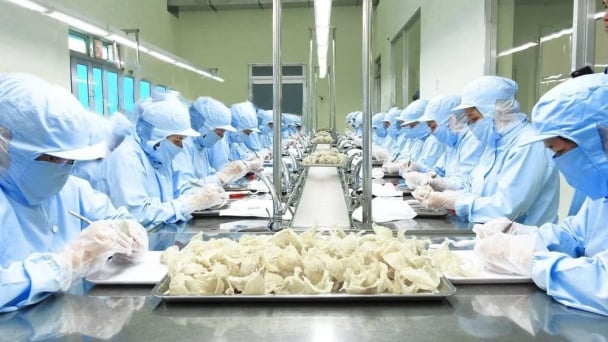May 16, 2025 | 10:02 GMT +7
May 16, 2025 | 10:02 GMT +7
Hotline: 0913.378.918
May 16, 2025 | 10:02 GMT +7
Hotline: 0913.378.918

Mr. Thuan's family's organic coffee garden. Photo: Dang Lam.
In 2020, Mr. Nguyen Huu Thuan, Thong Nhat village, Ia Din commune, Duc Co district, Gia Lai province, built a closed coffee production model from planting and harvesting to processing. He also associates with many households in the commune to expand coffee-growing areas, helping people increase their income.
Mr. Thuan's coffee garden is entirely cultivated according to organic processes, strictly controlling all stages. In addition to ensuring the use of pesticides in the list, he also pays attention to the settings of harvesting, pre-processing, roasting, and preserving and packaging finished products after harvest.
In Mr. Thuan's 2-hectare coffee garden, every tree is green and healthy. In October, his garden is about to harvest. Every coffee branch is heavy with fruit. Some fruit trees are ripe and red.
In particular, Mr. Thuan's garden has quite a lot of weeds. Unlike other farmers who often pull out all the grass, Mr. Thuan lets the grass grow naturally in the park. When the grass was about half a meter tall, he cut it at the base.
"Growing grass in the coffee garden helps the soil prevent erosion and washing away. Besides, grass retains moisture in the soil, helps microorganisms grow, loosens the soil, and creates an environment for natural enemies to grow," Mr. Thuan said.
The amount of grass he cuts is also a source of natural organic fertilizer, helping to add nutrients to the soil and helping coffee plants thrive.
With the farming method of "saying no to chemicals," Mr. Thuan's coffee garden is considered a model garden in the area, not only in the Ia Din commune but also in the entire Duc Co district. From a 2-hectare garden, Mr. Thuan's family began to create the Nguyen Sang coffee brand.

Mr. Thuan's "say no to chemicals" coffee garden is visited, studied and replicated by many locals. Photo: Dang Lam.
Organic farming gives long-term, sustainable benefits, but when switching to this method, Mr. Thuan could not avoid initial concerns. Because in the first years, coffee productivity will decrease. However, just a few years later, coffee productivity will gradually improve and reach a stable level, even higher than the traditional method.
Meticulously recording yields over the past three years, Mr. Thuan states that the harvest yield is now twice as high. Previously, his garden yielded about 4 tons of kernels/ha. In this 2023 crop year, the expected product is 8 tons of seeds/ha.
Mr. Tran Tien Tam, Dong Tam village, Ia Din commune, is one of the households with a coffee garden associated with Mr. Thuan in production following a sustainable coffee model. Not far from Mr. Thuan's house, Mr. Tam said that from 2021, his garden will be converted to organic farming.
Starting in 2007, Mr. Tam's 9ha coffee garden currently has a yield equivalent to 8 tons of beans/hectare. The crux of the problem lies in that he strictly follows the instructions, ensures the amount of watering and closely monitors harmful organisms in the garden.
Mr. Le Van Toan, Doan Ket village, Ia Din commune, also joined forces with Mr. Thuan for a 1-hectare coffee area. Even though he just joined, Mr. Toan's garden's productivity has improved significantly compared to the previous 5-7 tons of fresh fruit/ha.
In addition, Mr. Toan also significantly reduced the cost of purchasing pesticides and herbicides. The health of him and his family is also guaranteed.
Sound production is a standard organic method, but Mr. Thuan is unsatisfied. To awaken the flavor of coffee, right from the start of making the model, he invested in deep processing machinery in parallel with building and standardizing raw material areas.
The quality of raw coffee used for processing is strictly controlled by Mr. Thuan. In particular, coffee must be grown using organic and natural methods. When harvested, the fruit must ripen evenly, and at the same time, do not use chemicals or pesticides that are not on the list.

Mr. Thuan invests in the deep processing of organic coffee using modern technology. Photo: Dang Lam.
To ensure the quality of roasted coffee, Mr. Thuan sorts the cherries immediately upon harvest. To ensure sufficient ripeness, quality, and uniform design, the preliminary processing process is done meticulously in each step, such as sorting, washing, drying, etc. To have the best coffee flavor, Mr. Thuan invested in a hot air roaster system worth 500 million VND.
On average, each month, Mr. Thuan supplies about three quintals of roasted and ground coffee to the market. It is estimated that after deducting all expenses, his profit is 15 million VND. He is preparing documents and submitting them to Gia Lai Provincial People's Committee to approve Nguyen Sang coffee as an OCOP product.
Ia Din commune currently has nine farmer households associated with organic production, with a total area of about 15 hectares. Mrs. Nguyen Thi Thu Hue, Chairwoman of the Farmers' Association of Ia Din commune, commented that the association of farmer members in coffee production, according to an organic, closed process from production to processing, improves economic efficiency internationally.
"The model not only brings together households to cooperate in production but also develops deep processing and searches for markets. We will actively propagate and connect techniques and knowledge to help commune farmer members replicate this model," Mrs. Hue said.
Mr. Tran Ngoc Phan, Vice Chairman of Duc Co District People's Committee, pledged always to pay attention and continue to accompany initiatives and sustainable practices in coffee farming. "This is an inevitable trend. During promotions, calling for investment, and promoting products, Duc Co District People's Committee always prioritizes introducing local organic products to help promote and expand the market," he said.
Translated by Tuan Huy

(VAN) Japan's efforts to lower the price of rice through the release of its stockpile may finally be making some progress, albeit at a snail's pace.

(VAN) U.S. tariffs are not only a 'shock', but also an opportunity for Vietnamese businesses to renew their mindset toward comprehensive development.

(VAN) As Bac Giang lychee enters the harvest season, Minister Do Duc Duy expects that the fruit will contribute greatly to agricultural exports due to standardized production and deep processing.

(VAN) Consumers have shown a preference for free-range eggs, but those farming systems are more vulnerable to biosecurity risks like bird flu.
/2025/05/09/5701-1-184335_301.jpg)
(VAN) Vietnam’s eel exports nearly doubled thanks to a mud-free farming model, opening up new prospects while still facing numerous barriers related to international standards.

(VAN) Minister Do Duc Duy warned that if production is not professionalized and supply chains are not transparent, the U.S. market could become a growth bottleneck.

(VAN) Delegating surveillance responsibilities to local authorities is a cost-saving and efficiency-boosting measure that removes a key bottleneck for enterprises, according to Director General Duong Tat Thang.